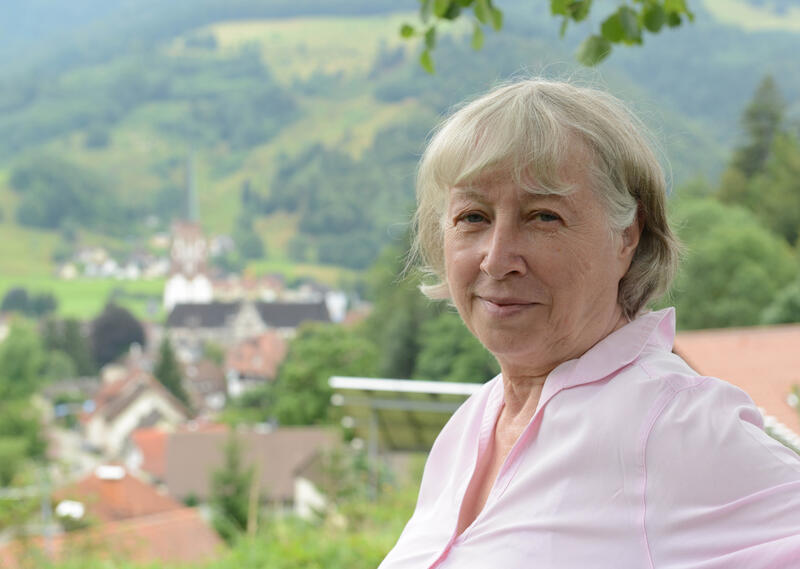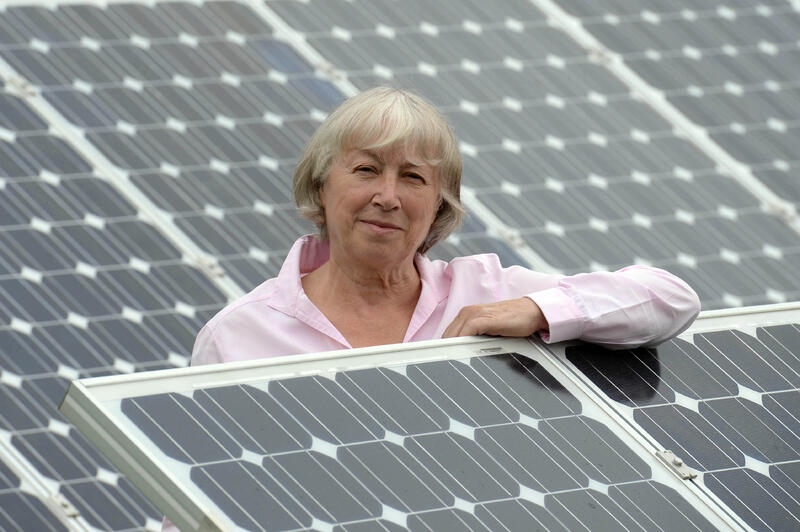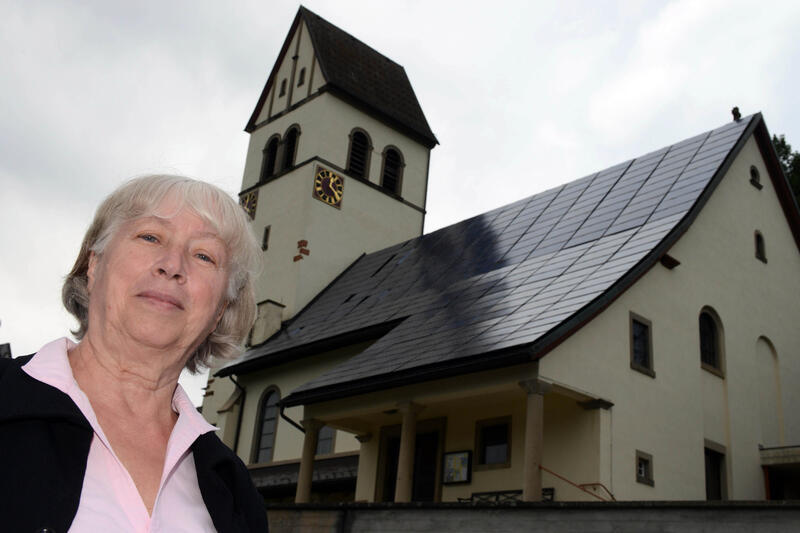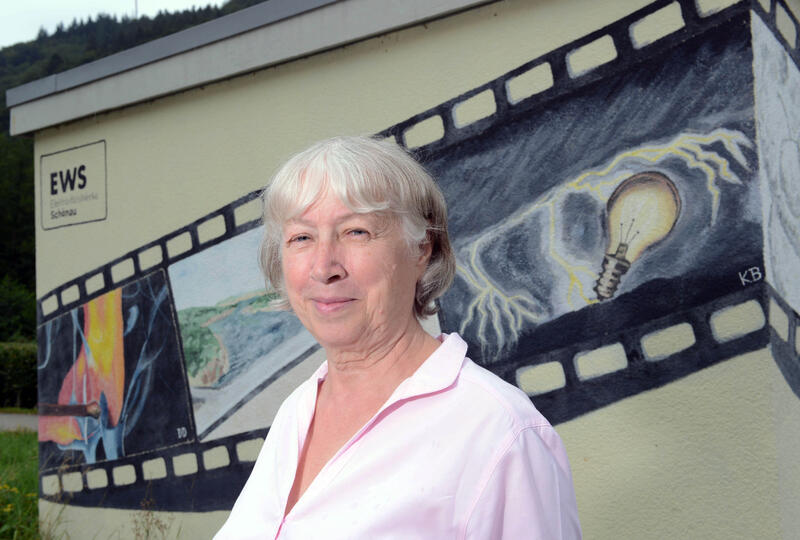Electricity rebel: local energy revolution initiated with “courageous citizens”
Schönau. “Her courage and dynamism are an exceptional example of how the shift to renewable sources of energy can succeed on a local basis. She established Germany's first green-energy supplier on the basis of a civic action group in Schönau and lives out the vision of a decentralised and eco-friendly energy supply. From the outset, she focused on close cooperation with members of the public and has proven that together it is possible to prevail against large energy suppliers and bring about ecological change. This makes her a model to society.” - This is how Dr. Fritz Brickwedde, Secretary General of the Deutsche Bundesstiftung Umwelt (DBU) today announced the presentation of the DBU's 2013 German Environmental Award to the chairwoman of the board at Netzkauf ElektrizitätsWerke Schönau (EWS) e.G., Ursula Sladek (67). German President Joachim Gauck will hand her the award in Osnabrück on October 27: 250,000 euros.
Sladek's goal: never to make as much profit as possible, but to set as much as possible in motion
Brickwedde stressed how Sladek had early on realised that the shift to renewable sources of energy could only be achieved together with members of the public and local authorities. After the nuclear accident at the Chernobyl reactor in 1986, Sladek, a trained teacher and the mother of five children, founded the association “Parents for a Nuclear-Free Future”, in which she chaired the board for ten years. These “electricity rebels” pursued the vision of a safe, effective and sustainable form of energy supply, Brickwedde said. He described how, with the help of experts, they acquired a copious amount of knowledge and founded the green-energy supplier EWS in 1994, for which Sladek still acts as chairwoman of the cooperative. After overcoming many obstacles and winning two local referendums, he said, Sladek and the EWS came out on top against the previous electricity supplier and took over the Schönau electricity grid in 1997, not allowing themselves to be intimidated by inflated selling prices. According to Brickwedde, her goal was never to make as big a profit as possible, but to set as much as possible in motion.
Public participation decisive factor in success of energy revolution
The Secretary General went on to say that public participation was a decisive factor in the success of the energy revolution in Germany and climate protection. By including the residents of Schönau in the work done by the EWS as electricity customers and by instituting a company policy of transparency, she “created trust, motivated people to act and made possible an ecological change,” Brickwedde said. It was only the social and financial support with donations that made it possible to prevail against the regional supplier with its mixture of conventional energy sources, and to realise the vision of a decentralised form of electricity supply based on renewable energies.

© DBU/Patrick Seeger

© DBU/Patrick Seeger
Began with Germany-wide electricity sales as early as 1999
Brickwedde pointed out that Sladek's commitment in the energy sector was of outstanding importance for Germany's shift in energy policy. From the start, he said, she had pursued a different goal than just selling green energy from hydroelectric plants and co-generation. He said she had wanted to make what started in Schönau known across Germany and to show people that they had to act themselves to bring about change. As early as 1999, Brickwedde said, one year after the electricity market had been liberalised, Sladek and her team in Schönau had begun selling electricity on a Germany-wide basis, and the number of customers increased considerably from 1,700 at the start to 150,000. He described how the EWS has included a so-called “sun cent” in the electricity rate to help subsidise, to date, more than 2,150 small photovoltaic, water, wind and bio-mass plants, in addition to co-generation power plants, for their customers. This money was also used for environmental projects, training and education programmes and campaigns promoting Germany's shift to renewables, he said. Today, the EWS also provided more than 8,500 customers in Bremen, Baden-Württemberg and Bavaria with gas or biogas.
Public participation in Schönau a model for other cities
The cooperative Netzkauf EWS was founded in 2009 to make it easier for people to participate in energy production and distribution, Brickwedde said. In this way, he said, the EWS had given fresh impetus to the ecologically motivated cooperative movement in Germany. Many cities and communities had taken the public-participation model in Schönau as a cue and were now supplying themselves independently with green energy, according to the DBU Secretary General. EWS, with all its know-how, was also available to provide information to other cooperatives that want to produce electricity from renewable energy sources and take over power grids, he said. He added that EWS was also working with municipal departments of works in towns and cities such as Titisee-Neustadt, Stuttgart and Schwäbisch-Hall, to provide more people with green energy.

© DBU/Patrick Seeger
Advancing the energy revolution with a sense of social responsibility
Brickwedde: “The initiative for a decentralised electricity supply that does without nuclear power and is derived mostly from renewable sources of energy was taken up by Sladek and her team at a time when the shift to renewables in Germany was not yet discussed widely and climate and environmental goals were not yet the focus.” Against this background, he said, this project was able to succeed only because of the extraordinarily committed and resolute way Sladek and the “courageous citizens” had acted. The “electricity rebel” Sladek had overcome all resistance and proved that citizens who take on social responsibility can together advance the energy revolution in Germany, he said.
German Environmental Award honours decades-long work by Sladek and her team
Sladek stressed that public-participation models could also advance the extension of power grids in Germany. She said everyone should be involved in the gigantic task of implementing Germany's shift to renewable power sources, above all German citizens themselves – because they had valuable knowledge and a lot of commitment that had to be put to use. She pointed out that civic action groups in many cities and communities were already taking on the task of participating in local power grids. Sladek went on to say that receiving the German Environmental Award meant a lot to her, as it honoured the decades of work she and her team had done to make the EWS what it was today: “a mixture of company and non-governmental organisation”.

© DBU/Patrick Seeger